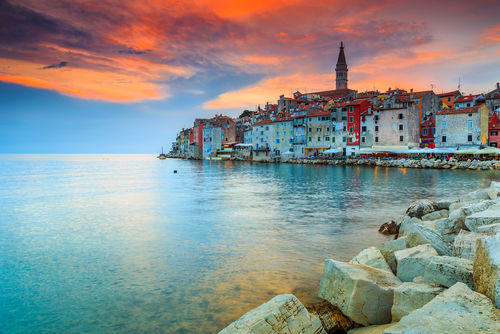I just returned from a distant land — Rovinj, Croatia — a small seaside village perched over the Adriatic Sea. It looks much like Venice, with narrow alleys, cobbled streets and tall narrow apartments weathered by time and sea air.
Window boxes are filled with flowers and laundry blows in the breeze high overhead on what look like rope clotheslines strung between buildings. The streets wind up a steep hillside that leads to the church of St. Euphemia, which can be seen from all over Rovinj.
The church is a focal point of the town, featuring a bell tower resembling St. Mark’s in Venice. It is a landmark with a story.
As the story goes, St. Euphemia was born in 290 in Chalcedon. At 15, she was arrested, tortured and thrown to the lions because she would not renounce Christianity.
Her body, however, remained intact and was preserved by the local Christians until about 620, when it was moved to a church in Constantinople. In about 800, the Christians were forced to move her remains again, although there is no record of where she was moved.
It is said her body finally turned up in a sarcophagus floating along the shores of Rovinj. No one was able to pull the heavy sarcophagus from the sea, let alone bring it up the steep narrow streets to the church, then called St. George, until a young boy with two cows came along and singlehandedly brought the sarcophagus out of the sea and up the hill to the church.
That he was able to do this was considered a miracle attributed to Euphemia, who was subsequently named protector and patron saint of Rovinj. Her feast day is Sept. 16 and is celebrated every year in grand style.
Learning about this saint and watching streams of people make the journey up the hill to see the church made me think that things related to God might be more relevant than we sometimes think. There is a reverence around the church, a sense that something special happened here.
While it is not deeply theological and certainly has been mythicized over the years, there is still an attraction to the spiritual element it suggests. After all, there are ample bars and restaurants vying for attention. Yet the church draws many people. A good sign!
The decision to travel to this beautiful place was last minute. One of our daughters invited my husband and me to join her family on their visit to her husband’s family in the town.
We hesitated, went back and forth on the “should” and “should not” elements of taking off in the middle of July on an unplanned trip to Croatia and finally threw caution to the wind and booked the tickets. It had been nine years since we last visited and none of us are getting any younger.
Years ago, when this daughter decided to study at the University of Padua during her junior year in college, we had no idea that Croatia would become important to our family. We figured she would learn Italian, make interesting new friends and increase her knowledge of the world which in turn might help her find a job upon graduation. We anticipated her coming home with stories, souvenirs and memories of the year abroad.
As it turned out she did make great friends, became fluent in Italian and does have lovely memories — especially the ones about meeting a fellow student from Croatia who became her husband.
When they married soon after college graduation, our son-in-law’s family and friends made the trip to Los Angeles and while there was a language barrier it did not stand in the way of each family understanding the significance of the moment or the ability to celebrate.
Despite the great distance between Los Angeles and Rovinj, a bond was created between the families. At the heart of this bond is love for our children and their two young sons.
It doesn’t make any difference that our languages are different, our foods not quite the same or that our traditions and cultures have their own unique ways. Love has a way of neutralizing differences.
During our stay in Rovinj, we spent time at the hotel pool and on the rocks overlooking the sea. Both areas were full of families on vacation speaking a wide range of languages.
We understood little as far as words but fully understood what was going on. Parents, children, teenagers and grandparents were swimming, snorkeling, laughing, eating and generally enjoying life together just as we were.
One afternoon I was in the hotel elevator with a grandmother talking a mile a minute to the baby she was holding in a language foreign to me. The baby was laughing at every word.
I commented on how cute the baby was. She replied in English, “This is the best.” We smiled in agreement and went our separate ways. Her words however, stayed with me.

